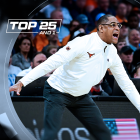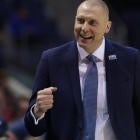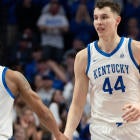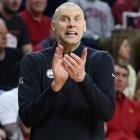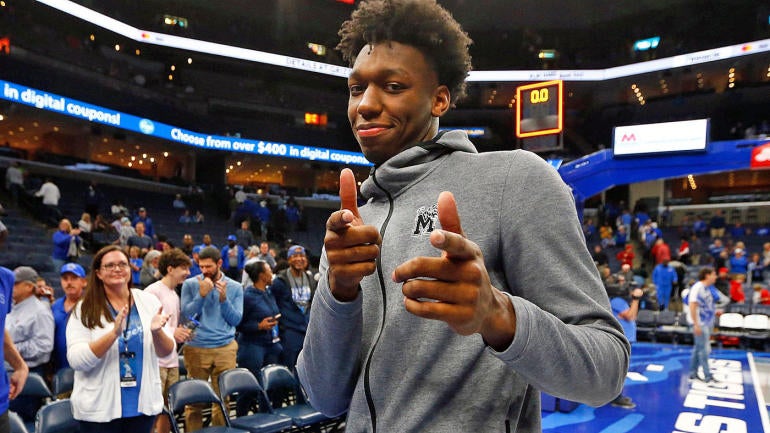
Thirty-four months after an investigation began, the Independent Accountability Resolution Process (IARP), finally ruled on Memphis' case involving NCAA rules violations in the recruitment of James Wiseman.
The verdict: Memphis' punishment isn't major. In fact, it's just the opposite. The IARP ruled Tuesday that the university must pay a $5,000 fine, in addition to "0.25% of its average men's basketball budget based on the average of the men's basketball program's previous three total budgets."
The program will go on probation, effective immediately, until Sept. 26, 2025. The school also has to vacate the two wins and all Wiseman-related stats from the three games he participated in back in November 2019.
Tigers coach Penny Hardaway was not directly assessed any penalties, and biggest of all, Memphis avoided a postseason ban.
"We have finally arrived at the end of an extremely challenging period, and I could not be more grateful," Hardaway said in a statement. "Our university and athletic department leadership worked tirelessly to help present the facts of our case. I am thankful to the IARP for allowing us to present those facts and making its decision based on the facts. It's now time to put all of this behind us. Brighter days are ahead, and we cannot wait to share in future successes as one Memphis."
The university initially was levied with seven total violations (four Level I), three of which were tied to Hardaway -- one Level I and two Level II infractions. The notice of allegations accused Hardaway of not establishing a "culture of compliance" as head coach of the men's basketball program.
But in Tuesday's ruling, the IARP stated that Hardaway's "long-standing philanthropic commitment, particularly to youth in the economically disadvantaged Memphis community, even prior to becoming an athletics booster" was a factor in its decision-making on this matter.
The penalties stem from a violation that occurred when Wiseman was in high school. Before Penny Hardaway became Memphis' men's basketball coach -- before he was employed by the university -- Hardaway paid $11,500 to help Wiseman's family cover moving expenses from Nashville in order for the Wiseman family to relocate to Memphis. Wiseman finished his high school career at Memphis East High School.
Given that Hardaway is a prominent Memphis alumnus, he was deemed a booster at the time. This triggered a rule violation.
Wiseman opted to play three games to start the 2019-20 season, in defiance of the NCAA's ruling, before turning course. After initially fighting the NCAA, Wiseman and his representatives withdrew the suit. The NCAA ruled he would have to sit for 12 games. Wiseman left Memphis' program in December 2019. He was the No. 2 overall pick in the 2020 NBA Draft by the Golden State Warriors.
The IARP "concluded that Memphis failed to monitor the education and activities of the head coach by not providing sufficient education to him regarding permissible activities for boosters and failing to ask the head coach about any financial contributions he had made to prospective student-athletes and their families in the Memphis community or any other relationships he may have developed with the high school or AAU players he had coached.
"The hearing panel also concluded that the institution's leadership allowed [Wiseman] to participate in a November 5, 2019, basketball contest without informing the head coach until after the contest that [Wiseman] had been determined to be ineligible to play," the IARP's press release states.
Being that this is an IARP case, there are no appeals allowed. This ruling is final and the case matter is complete.
"This investigation has been a cloud over the men's basketball program for three years, and we are happy to have the process concluded," Memphis president Bill Hardgrave said in a statement. "I would like to express sincere gratitude to members of our university staff, athletic department staff and legal team who devoted significant time to preparing the facts of our case, as well as the IARP for attentively listening to those facts and thoughtfully rendering its decision. We respect and will fully comply with the IARP's decision."
The IARP, which formed in 2019 as a 15-person panel and will dissolve in the coming months, took on Memphis' case on March 4, 2020. The IARP was created at the suggestion of the Rice Commission on College Basketball. That commission formed after the federal government's sting operation into bribery and fraud in college basketball became public.
This IARP ruling against Memphis comes five years and one day after that FBI case went public.
Tuesday's ruling marks the first in what will be the five final cases the IARP takes on. Louisville, Arizona, Kansas and LSU all still await their fates, and unlike Memphis, those four schools' cases are tied to the FBI probe.















